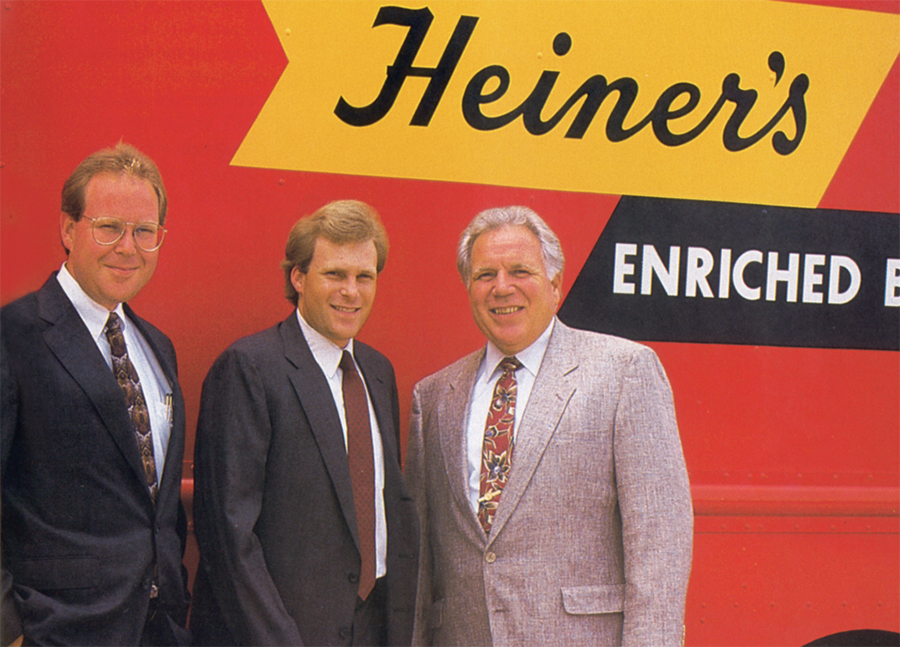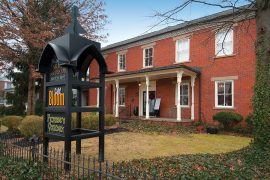The Heiner family of Huntington has been in the baking business for four generations and their success story is the best thing since sliced bread.
By Benita Heath
HQ 8 | SUMMER 1991
Earl Heiner Jr. remembers the strength in his grandfather’s hands – hands that literally molded a life sustaining product into a four generation business. Heiner was just a teen when his grandfather, Charles W. Heiner, founder of Heiner’s Bakery, died. Yet the younger Heiner has vivid memories of his grandfather.
“He had hands that were strong and large, and made my hands seem small by comparison,” the robust Earl Jr. recalled recently. “That strength came from mixing the dough in those days when there were no machines to do the job.”
“Those days” refers to 1905 when Charles Heiner took the baking skills he had acquired as an apprentice and opened his own bakery. He started out on Adams Avenue near the site of the present operation. His philosophy then was carried on for many years by his son and remains the philosophy of his grandson today.
“My grandfather told my father, ‘When you sell a loaf of bread for five cents, make sure there’s five cents worth of value in it,’” Heiner recalled.
The late Earl Heiner Sr. grew up in the bakery. “As a child, my father had to get up in the mornings – at that time we were making pies – and he prepared the fruit. After school, he had to come home and make the pies before he could go out to play,” Heiner said.
Earl Jr. was 14 when he discovered his family’s bakery business. He’d hitch a ride with the delivery truck drivers going out on their routes. He still remembers the grocer just outside Huntington who used to put the youthful Earl Jr. to the taste test. He’d offer Heiner three slices of bread – one from Heiner’s Bakery, the other two from competitors.
“He’d bet me I couldn’t tell which was ours,” Heiner recalled. “I always won.”
Despite his early initiation into the family business, Heiner was never pressured to make it his career, and that has been his philosophy with his own sons, Earl III, known as “Dutch,” and Charles. “My father never insisted that I work in the bakery,” Heiner said. “He wanted me to be happy in my job, whatever it was. And the same holds true with my sons. If they had not wanted to work here, it would have been fine with me. You have to be happy in your work.”
Yet both sons have joined their father in the family business. This sense of family pervades the modern-style offices of the bakery. In the lobby hangs a photograph of the founder, Charles, with his young son Earl Sr. posing in front of their horse-drawn bread truck. On the walls upstairs are many other family photos. Among those is a framed copy of a yellowing newspaper article from 1930 which indicates great leaps of productivity in the business from the early 1900’s to the 1930’s. In his one-oven shop, Charles Heiner could produce 200 pounds of bread daily. By 1930, the expanded bakery could boast a daily production capacity of 12,000 pounds of bread. Today, the assembly line system handles 50,000 to 60,000 pounds of bread a day. Eighty to ninety workers guide the process through the many steps required to turn spring wheat flour into loaves of bread, buns, dinner rolls, and other bread items. The facility is capable of mixing 1,600 pounds of dough in 14 to 17 minutes. And with the present ovens, 80 loaves can be baked in one minute.
Watching Earl Jr. walk through his modern facility, one can see he respects both man and machine. Workers on the line get a friendly “hello” or a wave from their boss as he proudly shows off the factory. Heiner is well experienced as a tour guide, and enjoys it. “As a leader in the bakery business, we have had people from all over the world go through the bakery,” Heiner said.
Keeping pace with technology is imperative in remaining an industrial leader, he says. Heiner’s officials regularly attend the international Bakery Expos, held every four years. There, they get to see the latest innovations, and occasionally pass on their own innovative concepts to other bakers. “Many times,” Heiner said, “we have come up with unique methods of production which machinery manufacturers have adapted and sold to other bakers around the world.”
Just as important to Heiner are the almost 300 employees who work throughout the entire operation. Each year the company honors those employees who have attained 25 years of service with the bakery. Later, those employees who have reached their 40th year of service are similarly honored. It is a credit to the organization that so many employees reach these levels of service.
“It’s a tough life,” Heiner said. “It’s a seven day a week business. Anyone who is unwilling to make the sacrifices involved is in the wrong business.”
Heiner, who holds a bachelor’s degree in business from Marshall University, had a lot of firsthand instruction in the business world from his father. “Like my grandfather, he knew what had to be done to be successful,” Heiner said. “We probably had three disagreements, and he won all three,” Heiner said. “He was very wise.”
Running a large scale bakery encompasses many facets of business, Heiner says. And that’s the appeal of his work. “You’re talking about production, sales, transportation, engineering, computerization, labor relations, marketing, and advertising.”
Heiner’s Bakery started the new decade with a ground breaking ceremony this summer for a multimillion dollar expansion. Under construction is an additional 30,000 square feet to be added to the bakery.
“This had been in the back of our minds for 10 years,” Heiner said. “You dream about it and think about it and you realize this is what you have to do at a certain point.”
Heiner views the expansion, which will be geared to produce the bakery’s variety breads, as insurance in the event of a major breakdown.
As he watches the hard hats pull up steel girders that will make the expansion project a reality, Heiner reflects on the company’s place in the Huntington community.
“This area has always been good to us, and we feel that we have been a good neighbor. Our roots are right here.”





